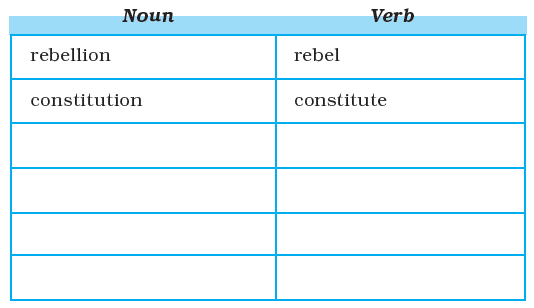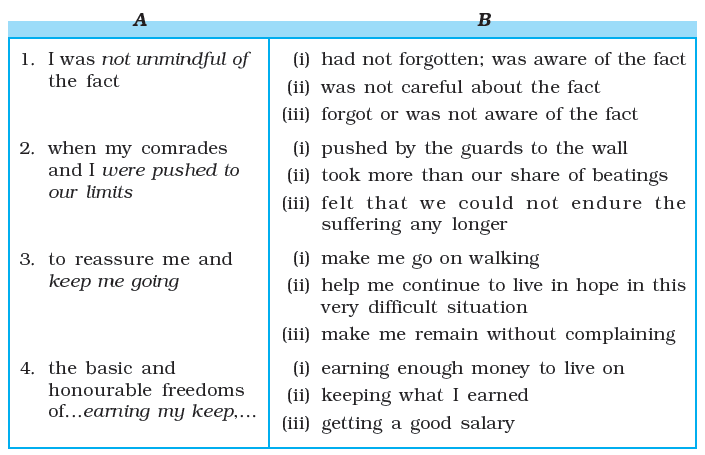Nelson Mandela: Long Walk to Freedom
Solutions For All Chapters First Flight 10
Oral Comprehension Check (Page 18,19)
Q1. Where did the ceremonies take place? Can you name any public buildings in India that are made of sandstone?
Answer: The ceremonies took place in the Union Buildings amphitheatre in Pretoria. In India, buildings like the Rashtrapati Bhavan, the Red Fort and the Parliament House are made of sandstone.
Q2. Can you say how 10 May is an ‘autumn day’ in South Africa?
Answer: 10 May is an ‘autumn day’ in South Africa because May comes in the autumn season there, as South Africa is in the Southern Hemisphere.
Q3. At the beginning of his speech, Mandela mentions “an extraordinary human disaster”. What does he mean by this? What is the “glorious … human achievement” he speaks of at the end?
Answer: By “an extraordinary human disaster” Mandela means the apartheid system that created deep oppression and suffering. The “glorious human achievement” is the establishment of freedom, justice, and democracy in South Africa.
Q4. What does Mandela thank the international leaders for?
Answer: Mandela thanks the international leaders for coming to share the victory of justice, peace, and human dignity with the people of South Africa.
Q5. What ideals does he set out for the future of South Africa?
Answer: He sets out the ideals of liberating people from poverty, deprivation, suffering, gender and other discrimination, and ensuring freedom and equality.
Oral Comprehension Check (Page 21)
Q1. What do the military generals do? How has their attitude changed, and why?
Answer: The military generals saluted Mandela and pledged loyalty. Earlier they would have arrested him, but their attitude changed because South Africa had become a democratic nation.
Q2. Why were two national anthems sung?
Answer: Two national anthems were sung to symbolise unity – the old anthem ‘Die Stem’ for the whites and ‘Nkosi Sikelel-iAfrika’ for the blacks.
Q3. How does Mandela describe the systems of government in his country (i) in the first decade, and (ii) in the final decade, of the twentieth century?
Answer: (i) In the first decade, whites built a system of racial domination against blacks.
(ii) In the final decade, that system was replaced by one that recognised the rights and freedoms of all people.
Q4. What does courage mean to Mandela?
Answer: To Mandela, courage is not the absence of fear, but the triumph over it.
Q5. Which does he think is natural, to love or to hate?
Answer: Mandela thinks it is natural to love, because love comes more naturally to the human heart.
Oral Comprehension Check (Page 24)
Q1. What “twin obligations” does Mandela mention?
Answer: Mandela mentions obligations to his family, and obligations to his people and country.
Q2. What did being free mean to Mandela as a boy, and as a student? How does he contrast these “transitory freedoms” with “the basic and honourable freedoms”?
Answer: As a boy, freedom meant running in fields, swimming, and obeying his father. As a student, freedom meant staying out at night, reading, and going where he liked. He contrasts these with “basic and honourable freedoms” like achieving potential, earning, marrying, and living without restrictions.
Q3. Does Mandela think the oppressor is free? Why/Why not?
Answer: Mandela thinks the oppressor is not free because he is a prisoner of hatred, prejudice, and narrow-mindedness.
Thinking about the Text (Page 24)
Q1. Why did such a large number of international leaders attend the inauguration? What did it signify the triumph of?
Answer: A large number of leaders attended to show support. It signified the triumph of freedom, justice, and democracy over apartheid.
Q2. What does Mandela mean when he says he is “simply the sum of all those African patriots” who had gone before him?
Answer: He means he is the result of the sacrifices and courage of many patriots who fought before him for freedom.
Q3. Would you agree that the “depths of oppression” create “heights of character”? How does Mandela illustrate this? Can you add your own examples to this argument?
Answer: Yes, Mandela illustrates it by saying that the brutal apartheid produced leaders like Oliver Tambo, Walter Sisulu, Chief Luthuli, Yusuf Dadoo, Bram Fischer and Robert Sobukwe, who showed extraordinary courage and wisdom.
Q4. How did Mandela’s understanding of freedom change with age and experience?
Answer: As a boy, freedom meant personal choices. Later, he realised his freedom was an illusion, and true freedom meant dignity and equality for all people.
Q5. How did Mandela’s ‘hunger for freedom’ change his life?
Answer: His hunger for freedom made him join the African National Congress, turned him from a law-abiding attorney into a criminal, from a family man into a man without a home, and drove him to live a life of struggle and sacrifice.
Thinking about Language
I. There are nouns in the text (formation, government) which are formed from the corresponding verbs (form, govern) by suffixing -(at)ion or ment. There may be a change in the spelling of some verb – noun pairs: such as rebel, rebellion; constitute, constitution.
1. Make a list of such pairs of nouns and verbs in the text.
Answer:
| Noun | Verb |
|---|---|
| rebellion | rebel |
| constitution | constitute |
| formation | form |
| government | govern |
| declaration | declare |
| unification | unify |
| establishment | establish |
2. Read the paragraph below. Fill in the blanks with the noun forms of the verbs in brackets.
Martin Luther King’s __________ (contribute) to our history as an outstanding leader began when he came to the _____ (assist) of Rosa Parks, a seamstress who refused to give up her seat on a bus to a white passenger. In those days American Blacks were confined to positions of second class citizenship by restrictive laws and customs. To break these laws would mean ______ (subjugate) and __________(humiliate) by the police and the legal system. Beatings, ________(imprison) and sometimes death awaited those who defied the System. Martin Luther King’s tactics of protest involved non-violent _______(resist) to racial injustice.
Answer:
Martin Luther King’s contribution to our history as an outstanding leader began when he came to the assistance of Rosa Parks, a seamstress who refused to give up her seat on a bus to a white passenger. In those days American Blacks were confined to positions of second class citizenship by restrictive laws and customs. To break these laws would mean subjugation and humiliation by the police and the legal system. Beatings, imprisonment and sometimes death awaited those who defied the System. Martin Luther King’s tactics of protest involved non-violent resistance to racial injustice.
II. Using the Definite Article with Names
You know that the definite article ‘the’ is not normally used before proper nouns. Nor do proper nouns usually occur in the plural. (We do not say: *The Nelson Mandela, or *Nelson Mandelas.) But now look at this sentence from the text:
… the decades of oppression and brutality … produced the Oliver Tambos, the Walter Sisulus, … of our time.
Used in this way with the and/or in the plural, a proper noun carries a special meaning. For example, what do you think the names above mean? Choose the right answer.
(a) for example Oliver Tambo, Walter Sisulu, …
(b) many other men like Oliver Tambo, Walter Sisulu …/many men of their type or kind, whose names may not be as well known.
Did you choose option (b)? Then you have the right answer!
Here are some more examples of ‘the’ used with proper names. Try to say what these sentences mean. (You may consult a dictionary if you wish. Look at the entry for ‘the’.)
1. Mr Singh regularly invites the Amitabh Bachchans and the Shah Rukh Khans to his parties.
Meaning: Mr Singh regularly invites many people like Amitabh Bachchan and Shah Rukh Khan (other famous film stars of their type) to his parties
2. Many people think that Madhuri Dixit is the Madhubala of our times.
Meaning: Many people think Madhuri Dixit is like Madhubala, the famous actress of the past – she represents her kind in the present times.
3. History is not only the story of the Alexanders, the Napoleons and the Hitlers, but of ordinary people as well.
Meaning: History is not only about great conquerors or dictators like Alexander, Napoleon and Hitler, but also about ordinary people.
III. Idiomatic Expressions
Match the italicised phrases in Column A with the phrase nearest in meaning in Column B. (Hint: First look for the sentence in the text in which the phrase in Column A occurs.)
Answer:
| (Column A) | (Column B) |
|---|---|
| (1) I was not unmindful of the fact | (i) had not forgotten; was aware of the fact |
| (2) when my comrades and I were pushed to our limits | (ii) felt that we could not endure the suffering any longer |
| (3) to reassure me and keep me going | (ii) help me continue to live in hope in this very difficult situation |
| (4) the basic and honourable freedoms of… earning my keep | (i) earning enough money to live on |



Leave a Reply